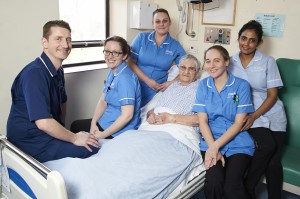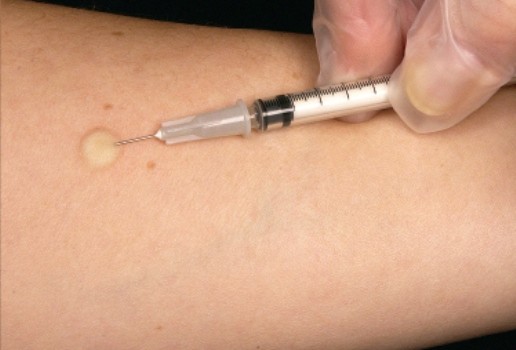Birmingham has one of the highest rates of diabetes in the UK with nearly one in 10 people in some parts of the city have the condition.
Diabetes Week is just around the corner and aims to raise awareness of this common condition.
Diabetes is a lifelong condition that causes a person’s blood sugar level to become too high. It is important for diabetes to be diagnosed as early as possible because it will get progressively worse if left untreated.
Melanie Patel, diabetes specialist nurse at Heartlands Hospital, highlights there are two main types of diabetes: “Type 1 diabetes can develop very quickly, in a matter of days or weeks. Where Type 1 diabetes is present, the body’s immune system attacks and destroys the cells that produce insulin. As no insulin is produced, your glucose levels will increase, which can lead to body’s organs being seriously damaged.
“To help manage the condition, health and diet are vital and regularly monitoring your glucose levels will also help. To keep your glucose levels normal, you may need regular insulin treatment. This mainly comes in the form of insulin injections.
“Type 2 diabetes, also known as ‘maturity onset’ diabetes, usually develops later in life and is much more common than Type 1 diabetes. Where Type 2 diabetes is present, the body either does not produce the required amount of insulin, or the body’s cells simply don’t respond to the insulin, resulting in insulin resistance.
“Treating Type 2 diabetes is usually achieved through lifestyle choices, such as regular monitoring of blood glucose, as well as having a healthy and balanced diet. However this is a progressive form of the disease and may eventually result in the need for medication – usually in tablet form. Some people with Type 2 diabetes will also need insulin injections.
“In both cases the symptoms are similar and will include an increased desire to drink as a result of being frequently thirsty, feeling very tired, losing weight and muscle bulk, and needing to urinate a lot, especially at night.”
Heartlands diabetes centre is one of the oldest and largest in the country providing a wide range of services to over 10,000 patients every year and accounting for nearly 26,000 visits annually.
For more information on diabetes, please visit: https://www.diabetes.org.uk/.
Diabetes Week takes place between 14 June and 20 June 2015.
 One in five children and one in twelve adults are living in the UK with eczema and Dr Tracey Finch, consultant dermatologist at Solihull Hospital, is inviting the public to join her for a talk about this common skin condition.
One in five children and one in twelve adults are living in the UK with eczema and Dr Tracey Finch, consultant dermatologist at Solihull Hospital, is inviting the public to join her for a talk about this common skin condition.
Eczema causes skin to become itchy, red, dry and cracked which can lead to inflamed skin and constant itching. Dr Finch will discuss steps that can be taken to prevent eczema along with treatments that are currently available.
Dr Finch said: “Eczema can affect any part of the body including your hands, scalp and around the neck. Factors such as heat and contact with liquids including soap, detergents and bubble bath, can make eczema worse.
“Attendees will have the opportunity to ask questions, discuss their own thoughts and experiences of eczema and find out about the range of services we provide to help patients.”
The seminar is taking place on Thursday 4 June at Solihull Hospital in the Education Centre between 5pm -7pm. To book your place or to find out details of the Hospital’s future health seminars, contact Sandra White on 0121 424 1218 or email: sandra.white@heartofengland.nhs.uk.
The Trust – which covers Heartlands Hospital, Solihull Hospital and Good Hope Hospital as well as some community based services – runs monthly health seminars to help raise awareness of a range of health conditions, as well as providing information about the treatment and support that is available.
Q1 Please could I have a break down of your non medical-non clinical temporary agency labour spend for the last 12 months. Non Clinical Agency spend 2014-15
Q2 Please could you also provide a list of the agencies that you used.
The list of agencies we’ve used in the last 12 months for Non-Medical Non-Clinical staff is:- Adecco, Badenoch, Brook, Id Med, Insource, Medisec, Meridian, Plum, Practicus,
R Half, Randstad, Reed, Rethink, Tate, TJC, Venn, Finegreen, Hays and Imperial
Q3 If at all possible could the information demonstrate spend by agency? We are unable to provide this information as as it would involve a invoice by invoice search which would exceed the 18 hours time limit as laid down in section 12 of the Act.
1. Total annual budget and monthly breakdown for food for patients.
Could you provide the data in each hospital for each of the last five
calendar years for which is available? Copy of Request Number 3787 – Patient Catering
2. Could you provide a breakdown of meals and number of times
served to patients over the above periods? Patients are fed three times a day.
3. Could you tell me the number of malnutrition inpatients in each
hospital over the above periods? The definition of malnutrition is as follows.
– Kwashiorkor – E40.*
– Marasmic Kwashiorkor – E42.*
– Unspecified severe protein-energy malnutrition– E43.*
– Mild protein- energy malnutrition– E44.1
– Unspecified protein-energy malnutrition E46.*
– Other malnutrition syndrome This questions cannot be answered using diagnostic codes.
| Site | 2010 | 2011 | 2012 | 2013 | 2014 | Grand Total |
| Heartlands | 113 | 109 | 89 | 83 | 75 | 469 |
| Solihull | 8 | 12 | 10 | 21 | 5 | 56 |
| Grand Total | 138 | 164 | 164 | 143 | 113 | 722 |
Good Hope 17 43 65 39 33 197
Every 15 seconds in the world, someone dies of tuberculosis (TB) and one third of the world’s population are infected with TB.
And did you know Birmingham has one of the highest rates of TB in the UK? The disease is not common in the UK, but it is on the increase and at present around 400 cases of TB are diagnosed in Birmingham every year.
TB is a bacterial infection which spreads from person to person through mucus, in the same way as colds are passed on. It is a serious condition which mainly affects the lungs, but can also affect other parts of the body, including the bones and nervous system.
Anyone can catch TB and people who are particularly at risk include:
- Those living in areas where levels of existing TB infection levels are high.
- People who have been in close contact with someone who has been infected.
- Those who have a weak immune system due to HIV.
- People who have lived in or travelled to parts of the world where TB is common.
Symptoms will vary depending on where the infection occurs and Hanna Kaur, lead nurse for TB at the Trust, highlights some of the symptoms to look out for: “Night sweats, weight loss, fatigue and loss of appetite are the most common symptoms.
“You could also end up having headaches, abdominal pain and swollen glands. But most TB cases can be cured and the majority of people will require a course of antibiotics for six months.
“Taking medication for six months is the most effective way of reducing the risk of TB spreading. Leaving TB untreated can be fatal and you should see your GP if you have a cough that lasts for more than three weeks or if you cough up blood.”
Here at the Trust we provide an extensive range of inpatient and outpatient services to help patients overcome TB. Family, friends and colleagues of TB patients are assessed by our specialist nurses and screened for TB if they are felt to have had significant contact with an infectious TB case.
Hanna adds: “TB can affect anyone meaning we see a diverse range of patients. Co-infected patients (patients who have TB and HIV) and vulnerable patients (alcohol dependant or homeless) are some of the people we see, along with children and adults.
“As part of my role as lead nurse for TB at the Trust, I’m responsible for managing a team of nurses and lead the TB service. We oversee patients and run clinics at the Birmingham Chest Clinic, Heartlands Hospital, Good Hope Hospital as well as homeless centres.”
If you are diagnosed with TB, there are precautions you can take to help prevent TB spreading to your friends and family:
- Stay away from work school/college until you are advised it is safe to return.
- Make sure you cover your mouth when coughing.
- Open windows when possible enabling you to take in a good supply of fresh air.
- Carefully dispose of any used tissues in a sealed plastic bag.
For more information about TB and the services the Trust provides, visit the Trust’s TB services website at http://tuberculosis.heartofengland.nhs.uk or call 0121 424 1395.
 An intrepid band of dementia carers will feel like they have the weight of the world on their shoulders this weekend as they tackle the highest peak in England and Wales to raise funds to help support their patients.
An intrepid band of dementia carers will feel like they have the weight of the world on their shoulders this weekend as they tackle the highest peak in England and Wales to raise funds to help support their patients.
The Dementia and Delirium Outreach team based at Solihull Hospital, part of Heart of England NHS Foundation Trust, will take turns wearing a special Age Experience Suit which simulates how it feels to be an older person as they climb Mount Snowden on Saturday 30 May.
The suit will add an extra challenge to the already gruelling task of scaling the 3,560ft of the mountain which the team are doing to raise money to help with the care of patients with dementia at Solihull Hospital.
Talking about the state-of-the-art Age Experience Suit that the team will wear as they climb Snowdon, Senior Dementia Nurse Phil Hall said: “We use the suit in staff training – it has weights that simulate muscle weakness, joint restrictors to simulate arthritis and a special glasses headset to represent visual impairment.
“This will really put the team in the skin of an elderly person and raise awareness amongst the staff about what they may be going through.”
The climb was Phil’s idea as leader of the dementia team at Solihull Hospital, although the somewhat surprising appearance of his beloved Aston Villa in their first FA Cup Final in 15 years has meant he has had to abandon his troops on the eve of the challenge!
Phil said: “I do feel rather guilty as this was all my idea but I had not anticipated Villa getting to Wembley when we started organising the climb and I couldn’t bear to miss it! I know the rest of the guys will do me proud though and I’m delighted they are all so keen to do the challenge and raise vital funds for dementia care.
“A quarter of all patients have got dementia and this group is particularly vulnerable while they are in hospital. We are making great strides in our care of people with dementia at Solihull Hospital with numerous new innovations and ideas being introduced as we continue to look at different ways we can provide a suitable environment for patients with dementia.
“All funds raised through this challenge will go towards helping with the care of patients with this complex condition while they are in our hospital with the purchase of a set of dementia friendly crockeries to support patients to eat and drink independently whilst on the wards, together with activity equipment to make their stay less stressful.”
To support the team and donate please visit www.justgiving.com/phil-hall11. If you are interested in raising money for your local hospital, or a particular department, contact the Fundraising Team at Heart of England NHS Foundation Trust on 0121 424 3838 or email: fundraising@heartofengland.nhs.uk
Did you know around 800,000 people living in the UK have dementia? It is estimated that by 2021, 1 million people living in the UK will have the disease.
This week is Dementia Awareness Week which aims to raise awareness of the disease and encourage people to think and talk about dementia.
Dementia is a common condition and usually occurs in people over the age of 65. The disease is a progressive condition that affects the brain and can lead to sufferers losing their memory and experience mood changes. People with dementia may also find social situations challenging and lose interest in socialising.
If you suspect that you or someone you know may have dementia, look out for the following signs and symptoms:
- Experiencing confusion and regularly forgetting things such as the names of people, places or recent events.
- Experiencing a range of mood swings. This could range from being scared, sad or even frustrated due to increasing memory loss.
- A loss of confidence and communication problems.
- Struggling to carry out everyday tasks.
Here at Heart of England NHS Foundation Trust, we are developing a dementia and delirium strategy. As part of this strategy, the Trust is looking at how services are designed around the needs of patients with dementia so they receive the care that is right for them and in the right environment.
One of the current initiatives to bring patients together in a friendly and stimulating environment is the ‘Singing for the Brain’ project. Staff on Ward 30 at Heartlands Hospital are working with the Alzheimer’s Society, to host monthly music sessions that patients and their family, friends and carers can take part in.
Gary Stanley, dementia support manager at the Alzheimer’s Society, said: “Singing is not only an enjoyable activity, it can also provide a way for people with dementia, along with their carers to express themselves and socialise with others in a fun and supportive group.”
Ryanne Musngi, senior sister for Ward 30 at Heartlands, said: “We are pleased to be working with the Alzheimer’s Society to host the Singing for the Brain sessions at Heartlands Hospital. Boredom and frustration are probably the most common causes of challenging behaviour in people with dementia, particularly if they are in an unfamiliar environment. By providing these sessions in a relaxed friendly environment, we have already noticed some improvements in our patients, moods are settled which results in less fear and confusion.”
For more information about dementia, visit: www.alzheimers.org.uk.
Dementia Awareness Week takes place between 17-23 May. You can also join in the conversation on Twitter by using the hashtag #DAW2015.
We are unable to split drug by condition. Please find below the number of vials/implants issued between January and April 2015.
| AFLIBERCEPT Injection | 627 |
| BEVACIZUMAB Injection | 440 |
| DEXAMETHASONE Intravitreal Implant | 27 |
| FLUOCINOLONE ACETONIDE Intravitreal Implant | 3 |
| RANIBIZUMAB Pre-Filled Syringe | 1929 |
1. For the month of March, please tell me how many patients did not attend outpatients appointments in ORTHOPAEDICS and ENT, ear, nose and throat, (in other words, how many DNAs did your trust record?) ENT DNAs – 430 (These are based on both new and follow up appointments) Orthopaedics DNAs – 807 (Same as above) 2. If possible, please tell me how many appointments are available for ORTHOPAEDICS and ENT in a typical week? Unfortunately we do not have this information electronically and would require a search of individual sheets to determine this thus exceeding the 18 hours of staff time as laid down by section 12 of the Act. 3. Is there a particular day or time of the week when DNAs are high? Please see below, figures are based on new and follow up outpatient DNAs for ENT and Orthopaedics specialties for March-15.
| Specialty | Mon | Tue | Wed | Thu | Fri | Sat | Sun | Grand Total |
| ENT | 87 | 78 | 43 | 70 | 49 | 37 | 66 | 430 |
| Orthopaedics | 180 | 212 | 154 | 126 | 129 | 6 | 807 | |
| Grand Total | 267 | 290 | 197 | 196 | 178 | 43 | 66 | 1237 |
Based on the figures above, DNAs for the two specified specialties appear to be highest at the beginning of the week. However this could be due to more clinics being run on these days, for example. 4. Are DNAs a particular problem at the hospital trust and do you have any initiatives to reduce them? We currently met the target set for DNA’s as a trust however Heartlands is higher than Solihull or Good Hope, we have the following measures in place to help reduce our DNA rates:
- Evening call Team who remind patients of their appointments two weeks prior to their appointment date
- Appointment letters are sent out 4 weeks prior to the patients appointment date rather than 6 month or 12 months in advance thus preventing the loss of letters
- We have a partial booking system for some specialties and they receive an automated remind call with an option to be transferred to the booking centre to speak to a member of our team
- Our letter heads have a clear yellow box asking patients to inform us if they cannot attend for their appointment, which they can do by:
o Phoning o Email to a specific email address o Posting a form to the Booking Centre
The figures below are based on inpatient admissions across the Trust in March 2015.
How many patients are you currently treating for Psoriasis? 4 patients admitted with primary diagnosis psoriasis.
How many patients are you currently treating for chronic eczema ? 18 patients admitted with primary diagnosis coded under eczema in different body systems. We cannot identify chronic eczema alone as a code for this does not exist.
Of these how many for hand eczema? 7 patients admitted under ICD10 code L30*. Similarly as above we cannot identify ‘hand eczema’ specifically, although it would be coded under L30* which has been used here as instructed by clinical coders.
Please find below the number of patients who have received the listed items from the beginning of May to date:
| ACITRETIN 10 mg Capsules | 10 |
| ACITRETIN 25 mg Capsules | 7 |
| BETAMETHASONE 0.1 % Cream | 9 |
| BETAMETHASONE 0.1 % Ointment | 9 |
| BETAMETHASONE AND CLIOQUINOL Cream | 9 |
| BETAMETHASONE AND CLIOQUINOL Ointment | 8 |
| BETAMETHASONE AND NEOMYCIN Ointment | 1 |
| BETAMETHASONE DIPROPIONATE 0.05 % Cream | 2 |
| BETAMETHASONE DIPROPIONATE 0.05 % Ointment | 3 |
| CLOBETASOL PROPIONATE 0.05 % Cream | 8 |
| CLOBETASOL PROPIONATE 0.05 % Ointment | 11 |
| FLUOCINONIDE 0.05 % Ointment | 1 |
| MOMETASONE FUROATE 0.1 % Cream | 1 |
| MOMETASONE FUROATE 0.1 % Ointment | 19 |
| TACROLIMUS (Advagraf) 1 mg Modified Release Capsules * | 1 |
| TACROLIMUS (Prograf) 1 mg Capsules * | 2 |
| TACROLIMUS (Prograf) 500 micrograms Capsules * | 2 |
| TACROLIMUS 0.03 % Ointment * | 3 |
| TACROLIMUS 0.1 % Ointment * | 8 |









